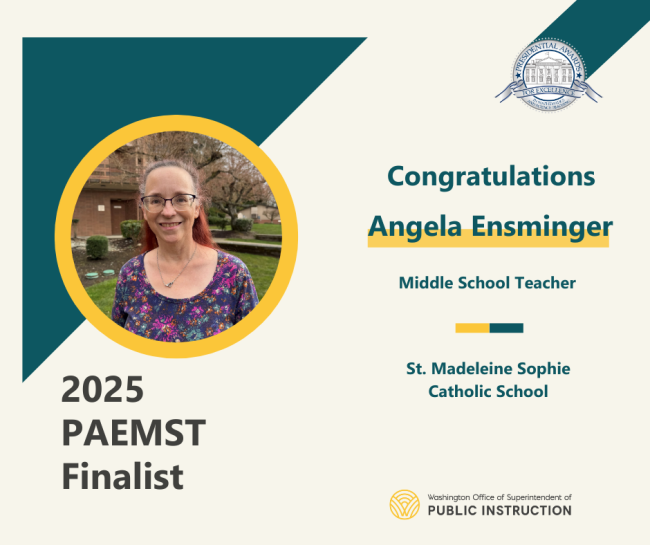Angela Ensminger
Media Contact
Katy Payne she/her
360-764-0201

What has been your personal journey on the way to excellence in teaching math/science?
I have always wanted to be a teacher. I pursued my passion by earning a Bachelor of Science. in Mathematics from Loyola University in New Orleans and began teaching my own classes. After moving to Texas, I completed an M.S. in Mathematics with a specialization in statistics at the University of Texas at Dallas, where I also taught calculus and statistics to undergraduates. This experience deepened my understanding of the interconnectedness of mathematical fields—an insight I strive to impart to my students today. Later, after relocating to Washington state, I earned my teaching license and played a key role in founding St. Madeleine Sophie, a school committed to inclusivity for all students, regardless of economic, social, or educational background.
What is one concept that excites your students and why?
My students love connecting math concepts to technology. In geometry, they used Tinkercad to code and design objects that demonstrated geometric transformations, which they then brought to life using our 3D printer. Similarly, seventh-grade students built robots to apply their understanding of surface area and volume. These hands-on activities help students see the real-world applications of math and make the subject more engaging and meaningful. In addition, I run a recess robotics program for students in grades 5–8. In the fall, we partner with Special Olympics Washington to compete in Unified Robotics, where students with intellectual disabilities collaborate with their peers to build and program a robot.
How do your lesson planning and teaching practices engage and support all students?
Our school serves a diverse range of learners, from high-achieving students who need continual challenges to those who require accommodations and modifications to succeed. With my background in teaching through the college level, I have a broad perspective on how mathematical concepts evolve in later courses, allowing me to guide advanced students toward deeper exploration. At the same time, I ensure that students who need support have access to lessons that are both engaging and accessible. I prioritize inclusive teaching strategies, such as using low-floor, high-ceiling tasks that allow every student to participate meaningfully. By designing lessons that encourage exploration and multiple entry points, I create a learning environment where all students can thrive.
How do the math and science concepts and skills you are teaching students help to prepare them for later learning, careers, and life?
One of the most important things I hope my students take away from their math classes is the ability to persevere through challenges and apply logical, critical thinking to solve problems. While they may not remember every formula or specific skill later in life, the habits of mind they develop—reasoning, analyzing, and problem-solving—are transferable to all areas of learning, future careers, and everyday decision-making. These foundational thinking skills are what truly prepare them for success beyond the classroom.
What can math and science teachers do to make those disciplines more culturally sustaining for students with diverse identities and experiences?
Teachers must begin by truly getting to know their students, their identities, communities, and what matters most to them. Building authentic relationships allows students to feel seen, heard, and valued in the classroom. Teachers should model what it means to be lifelong learners by being open to learning from their students and embracing the diverse perspectives they bring. By asking questions, listening deeply, and showing genuine interest in each student as a whole person, educators can create a more inclusive and responsive learning environment.
What advice would you give to parents, families, or caregivers who want to support their students’ math and science learning?
From an early age, model a love for math and science learning with your children. Read books together, play games that involve numbers or strategy, and take walks where you look for patterns in nature. Show curiosity about how the world works—your wonder and enthusiasm will be contagious! Encourage your child to ask questions, explore, and take risks in their thinking. Remember, your attitudes toward learning deeply influence theirs.






